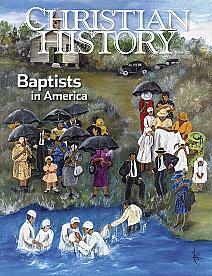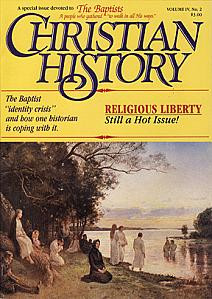Dunster Changed His Theology and Resigned from Harvard
HENRY DUNSTER sailed from England to escape religious persecution at home. A graduate of Cambridge University, he was soon invited to become the first president of Harvard. The college had opened under schoolmaster Nathaniel Eaton, who proved such a tyrant to his students and so stingy with their food that he was told to pack his bags and get out.
When Dunster accepted the job in 1640, the school was short of funds. In the fourteen years he managed Harvard, he was not once paid his full annual salary. On the contrary, he contributed to Harvard from his own pocket, even borrowing on his own credit for the school. By operating New England’s first printing press on the side, he was able to provide for his family (he had married a widow with children and later had children of his own).
For many years, Dunster was Harvard’s only professor. He modeled its system on English examples such as Eton College and his Alma Mater, Cambridge. Harvard in the twenty-first century is still governed by the charter Dunster drafted for it in 1650. He also drafted rules for the students, one of which read: “Let every student be plainly instructed and earnestly pressed to consider well, the main end of his life and studies is to know God and Jesus Christ which is eternal life.”
Appreciated for his sterling character and learning, Dunster was welcomed in New England pulpits. The whole community looked up to him. That changed after 1651, when Puritan authorities whipped minister Obadiah Holmes for his Baptist views. Seeing that the state could not refute Holmes’s claims, Dunster studied the Bible and concluded the Baptists were right. In 1653, he refused to have his newborn son baptized.
Had Dunster held his tongue, he could have stayed at Harvard. Usually he avoided controversy. However, in this case he breached decorum by preaching on the topic—considering the mistreatment of Holmes, it is hard to see how Dunster could have kept quiet. Harvard’s overseers voted that no one “unsound in faith” be allowed to continue in a teaching office. Dunster submitted his resignation, effective on this day, 24 October 1654. Because his wife was sick, the court allowed him to stay the winter in a house provided by the school (which he had built). It denied, however, any knowledge of Dunster’s extraordinary sacrifices for Harvard. The following spring, Dunster moved to Plymouth Colony, where he would die at the age of forty-nine.
—Dan Graves
----- ----- -----
For more about Baptists in America, read Christian History Magazine #126 - Baptists in America
For a mention of Dunster, see "The Baptists: Did You Know?" in Christian History #6, The Baptists







